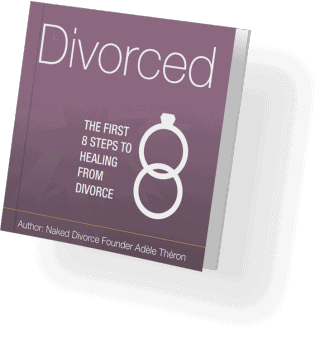
Free e-book: The First 8 Steps to healing from divorce

One of the most difficult and important aspects of negotiating the difficult terrain of separation is “helping children cope with divorce.” Divorce is a transformative experience that can have a profound effect on the lives of the divorcing couple’s children as well as themselves. It is our duty as parents to gently and sympathetically guide this difficult transition. We explore the complicated world of divorce trauma through the prism of parenthood in this extensive guide. We’ll look at the deep ways divorce affects kids, how differently it affects them, the possible harm it can do to their mental health, and most importantly, what you can do as an adult to assist your kids get through this trying period and grow up.
What is a Traumatic Event?
Trauma can result from situations that are too much for a person to handle and have a long-lasting effect on their mental and emotional health. The sense of safety and wellbeing are disturbed by traumatic occurrences, which frequently result in strong emotional reactions that can last for a long time. Even though they are frequently linked to potentially fatal circumstances, traumatic events can also result from extremely upsetting experiences like a marriage ending.
Can a Divorce Cause Trauma?
Although it’s not always fatal, divorce can be a devastating experience for many people. Strong emotions of distress and despair might be evoked by the emotional upheaval, sense of loss, and the disintegration of a once-shared future. Abruptly moving from a committed partnership to a solo life might trigger strong emotional reactions similar to those caused by trauma. The emergence of divorce trauma can be attributed to the psychological, social, and economical consequences of divorcing.
Understanding Divorce Trauma
It is important to identify the symptoms that may point to someone experiencing the fallout from a painful divorce as we examine the idea of divorce trauma and its effects. These symptoms include a wide spectrum of psychological, emotional, and even bodily cues that suggest the existence of divorce trauma. Knowing these warning indicators can help you recognize when you or a loved one may require assistance and intervention to deal with the difficulties of recovering from a painful divorce. Let’s examine the ten telltale indicators that illuminate the intricacies of divorce pain and the forthcoming healing process.
1. Intense Emotional Distress
Divorce-related aftereffects can release a barrage of emotions that leave people feeling lost in a sea of despair, rage, anxiety, and depression. These emotions reflect the altered emotional terrain brought about by the end of a meaningful connection; they are more than just fleeting moods. An overwhelming sense of emotional pain might result from the tremendous sense of loss and disruption that comes with divorce.
Understanding the impact of divorce trauma begins with acknowledging the depth of these feelings. By embracing the truth of your emotions, you give yourself permission to look for help and recovery. Recall that it’s acceptable to experience these feelings, and that getting help from a professional, such as through Naked Divorce’s Emotional Freedom program, can give you the skills you need to successfully negotiate the turbulent waters of emotional pain associated with divorce.
2. Avoidance of Reminders
The instinct to run from memories of a traumatic past is a normal reaction to shield oneself from additional emotional suffering. Avoidance can appear like a survival tactic when it comes to conversations, locations, and hobbies that were once treasured because they now carry the weight of pain. Avoidance, however it may provide short-term comfort, might impede the healing process. Even though it can be difficult, facing these triggers gives you back control over your life.
Talking to people about the divorce and going back to certain locations with fresh eyes will help you progressively lose control over these reminders. By confronting these triggers with expert assistance, such that provided by the Emotional Freedom program, you may reconstruct your story and reframe your connection to the past.
3. Intrusive Thoughts
It can feel like a never-ending struggle to maintain mental clarity when upsetting thoughts regarding the divorce suddenly invade your mind. Your mind may get overtaken by these unending ruminations, providing little room for constructive or upbeat thought. Acknowledge that these thoughts are a reflection of the emotional chaos you are dealing with. Recognizing them is the first step to taking back control of your mental environment.
By getting therapy, you can learn how to control these bothersome ideas and make room in your mind for healing. Keep in mind that your ideas do not define you, and with the right help, you can learn how to reframe your thoughts and put your wellbeing back in the forefront.
4. Emotional Numbness
It may appear as though emotional numbness is a shield against the excruciating sorrow of divorce. But it’s important to understand that holding emotions in check might ultimately impede healing. Detachment keeps you from truly interacting with life’s challenges and rewards, even though it may offer a momentary reprieve. Be it painful or not, acknowledging your feelings is a sign of self-compassion.
In a secure and encouraging setting, getting expert assistance—like that provided by the Emotional Freedom program—can help you navigate the process of reestablishing your emotional connection. Recall that being vulnerable and accepting your feelings are essential components of the healing process. This opens the door to significant personal growth.
5. Sleep Disturbances
Sleep, which should be a place of renewal, can turn into a battlefield for the emotional upheaval caused by divorce. Sleep deprivation due to insomnia and nightmares can exacerbate emotional suffering by preventing you from getting the necessary slumber.
An environment that is favorable to restorative sleep can be created by placing a high priority on relaxation and good sleep hygiene. By addressing the underlying emotional reasons of these sleep disorders, seeking expert counseling can help you navigate them. Recall that getting enough good sleep is essential to maintaining your health and that making changes to your sleep patterns can have a big influence on your recovery process.
6. Changes in Appetite
Following a divorce, eating patterns can fluctuate, which emphasizes the complex relationship between mental and physical health. These changes in eating habits, whether it’s binge eating or losing your appetite, are a reflection of your emotional condition.
Observe your body’s cues and apply them to get understanding of your emotional terrain. At this difficult time, seeking nutritional advice and support can help you develop a healthy connection with food. Recall that taking care of your physical needs can also support the development of your emotional resilience, and that making deliberate decisions can aid in your overall recovery.
7. Hyper Vigilance
Divorce stress can cause a heightened sense of alertness that might result in ongoing anxiety and restlessness. Although your need to defend yourself may be the source of this hypervigilance, it can also make it difficult for you to really experience the current moment.
Acquiring skills in mindfulness and relaxation might help you become more present-oriented. Getting expert help might provide you with strategies to control your anxiety and regain your composure. Recall that you may navigate life without always being on edge by learning to strike a balance between awareness and serenity.
8. Social Withdrawal
Divorce trauma can cause trust to be broken, which can result in self-imposed isolation and cut you off from the support systems you require. It’s important to understand that although solitude may provide brief comfort, it might intensify loneliness and impede your healing process.
Rebuilding trust and establishing new relationships can be facilitated by taking part in social activities at your own speed and obtaining expert advice. Recall that having people be a part of your healing process can help you find real support and friendship. Vulnerability is a strength.
9. Self-Esteem Issues and Negative Self-Perception
Following a divorce, one may experience a torrent of self-talk that is nasty and self-deprecating. Your confidence may be undermined and your self-image distorted by feelings of shame, remorse, and self-blame. Realize that these emotions don’t truly represent how valuable you are.
You can improve your self-concept and self-esteem by confronting these unfavorable ideas and going to treatment. Recall that self-compassion is an effective healing technique. You may change your story and accept your intrinsic worth by being kind to yourself.
10. Physical Symptoms
Physical manifestations of stress highlight the complex relationship between the mind and body. Tension in the muscles, headaches, and digestive problems are physical signs of the psychological anguish brought on by divorce trauma. Taking note of these symptoms is a way to admit that divorce has negatively impacted your general health.
Getting evaluated by a doctor and using stress-reduction methods can help with these physical symptoms. It is important to keep in mind that healing encompasses both mental and physical components. By taking care of your bodily needs, you give yourself the ability to start a healing process that is holistic in nature.
Conclusion
Divorce trauma is a genuine, complicated event that can affect a person’s life in many ways. Effective healing and moving on after divorce depend on identifying the warning signs and getting the right support. Recall that you are not traveling alone. Seek the assistance you require to recover your emotional independence and general well-being.
At Naked Divorce, we have Recovery Programs and Retreats that have been created around helping you navigate the divorce grief life cycle in a healthy way.
Get in touch with Naked Divorce if you need support on your divorce journey.
If you enjoyed this post, I’d be very grateful if you’d help it spread by emailing it to a friend, or sharing it on Twitter or Facebook.
With you in service,


For a more personalized approach to your healing journey, book a free Clarity Call now. Our coaches are here to help you take your first steps towards healing. Check out our Resources or our Videos on YouTube.

